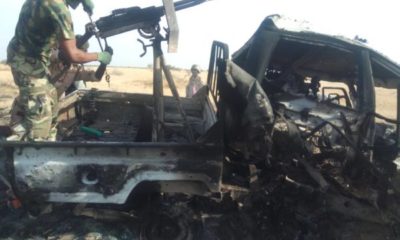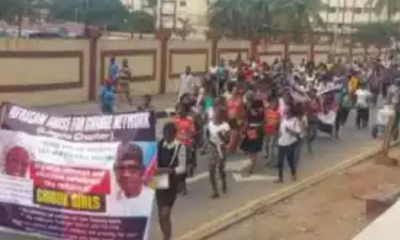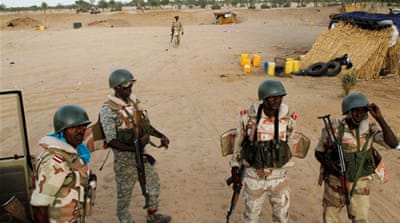Nigerian Newspapers
Boko Haram… Violence persists despite emergency
State of Emergency was declared to clip their wings. But, Boko Haram members have found a way where there seems to be no way to continue their campaign of violence against the government and the ordinary people, writes Reuters
They crept up to the school under cover of darkness, armed with petrol and automatic weapons.
Most of the teachers and pupils had fled, but some students, one teacher and headmaster Adanu Haruna were still in the compound, one of many rural boarding schools in Nigeria surrounded by forest and farmland.
“They made the students line up and strip naked, then they made the ones with pubic hair lie face down on the ground,” Haruna said, eyes wide with horror at describing the attack on the iron-roofed school built by British colonisers in the 1950s.
“They shot them point blank then set the bodies on fire.”
The Mamudo government school, charred and smelling of scorched blood after 22 students and a teacher were killed there in the July 6 attack near Potiskum in Nigeria’s northeast, was the fourth to be targeted by suspected Boko Haram militants in less than a month.
The attacks reveal much about the rebels who are fighting to revive a medieval Islamic caliphate in northern Nigeria, the type of state they are seeking to establish and the impact of their efforts to do so on the African economic powerhouse.
In a video uploaded to the Internet on Saturday, Boko Haram’s purported leader Abubakar Shekau denied ordering the latest killings, saying Boko Haram does not itself kill small children, but he praised attacks on Western schools.
“We fully support the attack on school in Mamudo, as well as on other schools,” he said. “Western education schools are against Islam … We will kill their teachers.”
Boko Haram, a nickname which translates roughly as “Western education is sinful”, formed around a decade ago as a clerical movement opposed to Western influence, which the sect’s founder, Mohammed Yusuf, said was poisoning young minds against Islam.
Yet security forces and politicians were the main targets of the armed revolt it started after Yusuf’s killing in a 2009 military crackdown that left 800 people dead.
Since those days Boko Haram has splintered into several factions, including some with ties to al Qaeda’s Saharan wing, which analysts say operate more or less independently, despite Shekau’s loose claim to authority over them.
Before June, there had been only a handful of attacks on the Western-style schools it so despises.
An offensive against the insurgents since President Goodluck Jonathan declared a state of emergency in three remote northern states in May, wresting control of the far northeast from Boko Haram and pushing its fighters into hiding, has changed that.
Across north-eastern Nigeria, schools are emptying out, threatening further radicalisation and economic decline in a region left behind by the country’s oil-rich Christian south.
Nassir Salaudeen, a teacher whose son was killed in a strike on Damaturu government school on June 16, the first of the wave of recent attacks, said he had put all his efforts into his boy’s education in the hope he would get a good job.
“They killed him in cold blood, just because he was a student and his father a teacher,” a tearful Salaudeen said. “I regret ever being educated.”
“SOFT TARGETS”
For some, the school attacks are a sign the offensive has weakened the Islamist group, which is still seen as the main security threat to Africa’s leading oil and gas producer.
“Given the security clampdown, many of the places like police stations or the military are getting harder for Boko Haram to hit,” said Kole Shettima, chairman of the Centre for Democracy and Development. “Schools are soft targets.”
But the attacks also reflect a radical ideology that resents modernity and yearns to wind back the clock to an era before West African lands were conquered by Europeans.
Centuries ago northern Nigeria, like much of West Africa, was ruled by Islamic empires feeding off trans-Saharan trade routes connecting Africa’s forested interior with its Mediterranean coast.
Boko Haram rarely gives statements to the media. But the little it has said suggests it wants to restore those glory days.
Last year, the sect said it wanted to revive the 19th century caliphate of Usman Dan Fodio, an Islamic scholar who threw off corrupt Hausa kings and established strict Sharia law.
When Britain established Nigeria as a territory, it agreed to spare the largely Muslim north’s leaders the activities of missionaries, who brought Christianity but also education and literacy that gave the south a head start over the North.
The North was able to retain its Islamic culture but at the cost of suffering economically; political and economic power has shifted to the south and the education gap has played a role in that growing discrepancy.
A lack of education and high youth unemployment has also helped Boko Haram’s Islamist ideology to thrive.
“Boko Haram think the secular school system has brainwashed Nigerians to accept the post-colonial Western order and forget the Islamic ways that existed before,” said Jacob Zenn, an expert on the sect at the Washington-based Jamestown Foundation.
The attacks, which the U.N. children’s fund (UNICEF) says have killed 48 students and seven teachers in the past month, aim to scare parents and their kids away from schools.
“It says: ‘either take your children out of school or put them into an Islamist school we approve of’,” Zenn said, one that teaches only in Arabic and omits courses like science.
He added that such schools need not necessarily be Boko Haram sponsored: there are conservative Islamic schools for children where they study under an Imam and the curriculum is all in Arabic and focused on the Koran. The sect accepts them.
“SCHOOLS DESERTED”
Many people are turning away from education altogether.
“The risk isn’t worth it. These guys are just mindless,” said Mike Ojo, a mechanic in the north-eastern city of Maiduguri who is taking his three children out of school.
Even if they stayed, many teachers have left, said teacher Ali Umar from a Maiduguri secondary school, and in many schools there are often too few teachers for the pupils who stay put, leaving them with little choice but to leave.
“I am not prepared to die for teaching. Time to start looking for a new job,” he said, shrugging. “Most of our schools are deserted anyway.”
The spot where Halima Musa’s husband was shot dead at their home on June 16 — in front of her and the children — is still caked with his dried blood, the wall pocked with bullet holes.
They came at 3 a.m., guns blazing, demanding she open the door. She begged them to stop as they dragged the teacher out.
“They shot him three times in the head and told me that this should be a lesson not to marry a western educated person or any person that works for President Jonathan,” she said, choking back tears in front of three traumatised children.
Yobe State Education Commissioner Mohammed Lamin complained that the military had not done enough to protect schools from attack, even after they were targeted.
Before the murderous assault on the Maumdo school, there had been an earlier attack on May 8, in which some property was burnt. Headmaster Haruna said the security forces he called for help patrolled initially but stopped after a week.
The military was not immediately available to comment, but it has said in the past it is doing all possible to protect civilians while crushing the insurgents in its offensive.
Schools are a devastating target for an impoverished region suffering a high rate of illiteracy, but Lamin says he is determined that Yobe’s children get educated.
“These terrorists are trying to stop western education but we cannot allow them do that,” he said. “We must do everything to ensure children are safe in the school.”
————————————————————————————————————————-
Posted in Nigerian Newspapers. A DisNaija.Com network.
Source: The Nation Newspaper
DisNaija.Com publishes regular posts on Nigeria News, Nigerian Newspapers, Online Nigeria Gist.
Follow us on Twitter and Facebook.
Nigerian Newspapers
Follow @Dis_Naija
Your Opinion Counts. Be sure To Leave A Comment, If You Have Any.
Please Like, Share or Tweet. Your Support Is Appreciated.
This Day
Military, Police Ring Abuja to Forestall Boko Haram Attack
•Deploy more personnel as army chief vows to wipe out terror group
•Security beefed up at N’Assembly
Deji Elumoye and Kingsley Nwezeh in Abuja
Abuja, Nigeria’s seat of power, is under a massive security cordon following threats of attacks by insurgents and the increasing wave of banditry in the contiguous states of Kaduna, Kogi, Nasarawa and Niger States, THISDAY’s investigation has revealed.
There has been a wave of kidnappings in the outskirts of the federal capital, notably Pegi, Tuganmaje and Kuje among others, which the police have battled in recent times.
The security situation in and around the Federal Capital Territory (FCT) was heightened by the pronouncement of the Niger State Governor, Mr. Sani Bello, that Boko Haram fighters who he said sacked 50 villages in the state and hoisted the terror group’s flag, were about two hours drive away from the FCT.
Security has also been beefed up at the National Assembly as operatives, yesterday, thoroughly screened every vehicle approaching the National Assembly complex in Abuja.
The deteriorating security situation nationwide prompted the National Chairman of the Peoples Democratic Party (PDP), Prince Uche Secondus, to warn that the 2023 general election may not hold, demanding the declaration of a state of emergency as well as the convocation of a national conference.
However, the Chief of Army Staff, Lt. Gen. Ibrahim Attahiru, yesterday restated the Nigerian Army’s determination to annihilate Boko Haram.
But the Governor of Katsina State, Hon. Bello Masari, cautioned against declaring a state of emergency, saying doing so isn’t the solution to combat the security challenges facing the country.
The security of the nation’s airports was also in focus yesterday as the Office of the National Security Adviser (ONSA) said there was no threat to them.
THISDAY’s investigations showed increased presence of troops, police, Nigerian Security and Civil Defence Corps (NSCDC) personnel and intelligence operatives at the three strategic entrances to the city notably, Keffi, Zuba and Gwagwalada.
More checkpoints were also mounted around Gwagwalada and Keffi.
THISDAY also observed increased intelligence deployment at the entrance and the borders of FCT with contiguous states.
Beyond the borders, there were more deployments and police patrols inside the city and increased intelligence deployments as well.
Security sources told THISDAY: “There are deployments here and there but they are routine. Alertness is key to a secure environment.”
It was also learnt that security agencies were involved in frenzied meetings throughout yesterday.
The meetings, coordinated by the office of the Chief of Defence Staff under the new joint operational strategy of the armed forces, were aimed at coordinating a joint response to possible threats of attack to the FCT.
“I understand the security teams have been meeting for some days now and if you look around you, you will notice that there are increasing patrols and numbers of security personnel. The threats are not been taken lightly,” a source said.
National Assembly workers, lawmakers and visitors also had a harrowing experience accessing the legislative complex due to heightened security in the area.
Security operatives thoroughly screened every vehicle approaching the National Assembly complex in Abuja, impeding both human and vehicular traffic.
The Sergeant-at-arm of the National Assembly and other security agencies supervised the operations, leading to huge traffic build-up inside the complex.
Legislative staff, visitors and lawmakers were seen patiently waiting for their cars to be searched so that they could go ahead with the business of the day.
Some staff and visitors at some point got tired of waiting and were seen alighting from their cars to trek from the gate to the complex.
Meanwhile, the ONSA has said there is no threat to the nation’s airports.
A statement by the Head of Strategic Communication, Mr. Zachari Usman, said the reports of threats to the airports were an internal correspondence of security threat assessment misconstrued as security threat to the airports.
PDP Demands State of Emergency
In a related development, the PDP National Chairman, Prince Uche Secondus, yesterday demanded the declaration of a state of emergency, warning that the 2023 general election might not hold if the federal government failed to tackle insecurity.
He called on the federal government to summon a national conference to address the spike in insecurity.
Secondus added that the national caucus of the party will meet today to discuss the state of the nation.
Addressing members of the National Executive Committee (NEC) in Abuja, Secondus said: “We are worried Abuja is not even safe. It is no longer politics. We got alert of plots to bomb and burn down our airports.
“We urge the federal government to declare a national state of emergency in security. There is the need to call a national conference to discuss the insecurity in the country.
“There may not be any election in 2023 in Nigeria due to insecurity. This government must listen to the people. The Buhari government should call a national confab to discuss security and state of the nation. It is no longer politics. This time we are not playing politics. Let’s keep politics aside and move the nation forward.”
He said the country had been grounded, regretting that there had been no matching response from the federal government.
Secondus said in the past, terrorism in the North was confined to the North-east, but with the report of Boko Haram occupying villages in Niger State, terrorism had spread to the North-central
“Herdsmen are also menacing in the West; gunmen causing havoc in the East; and the militants in the South; all killing, looting, raping, maiming and burning down homes. The situation is bad; Nigerians all over are living in fear,” he said.
The Senate Minority Leader, Senator Enyinnaya Abaribe, said the problem of Nigeria was outside of the PDP headquarters, while pledging the support of the Senate to the declaration of state of emergency in security.
Abaribe said he deliberately decided not to speak on the floor of the Senate but to allow the APC senators to speak so as to avoid being accused of giving a partisan colouration to the issue of insecurity.
He stated that only electoral reforms would give victory to the opposition party in the 2023 general election and ensure a democratic defeat of the APC-led federal government.
Also, the Minority Leader of the House of Representatives, Hon. Ndudi Elumelu, commended the NEC and the PDP leadership for their collective efforts at resolving the House leadership crisis.
The NEC meeting adopted the position of Secondus, calling on the federal government to convoke a national conference to discuss the state of insecurity in the country, according to a communiqué read by the National Publicity Secretary, Mr. Kola Ologbondiyan.
Army Chief Vows to Wipe Out Boko Haram
The army yesterday reiterated its commitment to wipe out Boko Haram.
Chief of Army Staff (COAS), Lt. Gen. Ibrahim Attahiru, told reporters in Maiduguri, Borno State that Boko Haram had been defeated in many encounters and would continue to be defeated until it’s annihilated from Nigeria.
“We will take on Boko Haram decisively, and we are committed to the focus of the operations, which is the total annihilation of Boko Haram from Nigeria,” he said.
The COAS, who was visiting the headquarters of Operation Lafiya Dole in Maiduguri for the fifth time since his appointment four months ago, said the visit was to boost the morale of the troops, reassure them and listen to any issues affecting them.
Earlier, the Theatre Commander of Operation Lafiya Dole, Maj. Gen. Farouq Yahaya, lauded the visit, which he said had continued to boost the morale of the troops.
“We are honoured, we are grateful, we are encouraged by those visits. You provided us guidance, logistics and other things we required. We are most grateful for those visits,” Yahaya said.
State of Emergency Won’t Solve Security Challenges, Says Masari
Katsina State Governor, Hon. Aminu Masari, has, however, said declaration of a state of emergency won’t solve the security challenges facing the nation.
Masari, who spoke yesterday with journalists after meeting with the Chief of Staff to the President, Prof. Ibrahim Gambari at the State House, Abuja stated that he was against the recent call by the House of Representatives for the declaration of a state of emergency in the security sector as it would not solve the problem.
According to him, declaring a state of emergency will not achieve the desired effect as the security structure and personnel to be used to execute the emergency are already overstretched in a bid to safeguard lives and property.
Sourced From: THISDAYLIVE
Tribune
Nigeria records 55 new COVID-19 infections, total now 165,110
Tribune Online
Nigeria records 55 new COVID-19 infections, total now 165,110
The Nigeria Centre for Disease Control (NCDC) has recorded 62 new cases of COVID-19, bringing the total number of infections in the country to 165,110. The NCDC disclosed this on its official Twitter handle on Friday. “55 new cases of #COVID19Nigeria; Lagos-21, Yobe-19, Ogun-6, Akwa Ibom-3, Kaduna-2, Plateau-2, FCT-1, Rivers-1.” YOU SHOULD NOT MISS THESE HEADLINES FROM NIGERIAN TRIBUNE COVID-19: Nigeria Recorded […]
Nigeria records 55 new COVID-19 infections, total now 165,110
Tribune Online
Sourced From: Tribune Online
Vanguard
Attacks on S’East: We must explore all options of negotiation — Stakeholders urge Igbo

By Olasunkanmi Akoni
The people of the South East region have been urged to explore the power of negotiation and mutual settlement in the face of ongoing killings and security challenges in the zone because the east can not afford another war at present.
Stakeholders from the South-East geo-political zone made the remark on Thursday, at the unveiling of the book, “Igbo, 50 years after Biafra,” written by Special Adviser to Lagos State Governor Babajide Sanwo-Olu on Drainage Services, Joe Igbokwe, held at Ikeja G.R.A.
Speaking at the unveiling of the book, the chairman of the occasion, Mr. Cutis Adigba,
urged the people of the South-East to learn to build bridges across the country, so that they can realise their ambition of producing the next president of Nigeria.
Adigba urged leaders from the zone to discourage the move and agitation by some youths in the South East to go to war and secede out of Nigeria.
Also read: Banditry: Disregard viral video, Niger State gov’t urges residents
He said that Igbo have always found it difficult to rule Nigeria because they refused to build bridges across the six geo-political zones that made up Nigeria.
While describing the agitation as uncalled for, Adigba noted that after two decades that Nigeria returned to civil rule, the Igbo has predominantly identified with only one political party.
He maintained that remaining in one party can not advance the cause of the people of South East and cannot make them realise their objective of producing an Igbo man as president.
He maintained that the publisher of the book, Igbokwe played politics outside his state, so that the Igbo race can be integrated with one another race.
Adigba said the failure of the Igbo to reintegrate with other ethnic nationalities politically was responsible for the retrogression of the race in Nigerian politics.
Igbokwe, also addressing guests on the occasion, maintained that the Igbo are not advancing politically because they refused to be integrated into National politics, lamenting that, despite their success in business, they are not successful in playing politics at the national level.
Corroborating Dimgba, Igbokwe noted that there was the need for the Igbo people to stand up and build bridges so that their objective of producing the next president of Nigeria could be realised.
According to him: “I have decided to raise my voice, I hope my people will hear me while trying to quell the effect of the war, our people are spoiling for another war, mayhem is being unleashed in Igbo land, and there is palpable fear.
“Those who could speak have lost their voice, mindful of the consequences of their actions, I am calling on all Igbo leaders to speak up because all actions carry consequences, consequences of the silence will be too dastardly to sustain.
“Those silently supporting the wild wind should be careful or else they hand over to their children,” he said.
Igbokwe urged those spoiling for war to jettison their plan and embrace dialogue, urging them to learn from the South West region that despite the challenges faced after the annulment of the June 12, 1993, election, they did not go to war, and the region had the opportunity of producing two of her sons for presidential position in 1999.
“You have to build bridges to become president of Nigeria, but it is unfortunate the Igbo are burning bridges.”
Speaking at the event, Chief Uche Dimgba who is the coordinator of Igbo in All Progressives Congress, APC in Lagos, described Igbokwe as “a Frank, fearless and reliable leader, who based his views on issues and stand by his opinions, and we the Igbo have confidence in him and believe he can lead us aright.”
“He is a leader we Igbo believe in and we will follow him. If he can serve all the governors produced in Lagos State since 1999, he is a better man to follow because he possesses all the experience that can be of benefit to Igbo both at home and in the diaspora.”
The post Attacks on S’East: We must explore all options of negotiation — Stakeholders urge Igbo appeared first on Vanguard News.
Sourced From: Vanguard News
Premium Times
Insecurity: Lagos bans occupation of abandoned buildings
The government said that no worker should stay back beyond 6:00 p.m. within premises of buildings undergoing construction.
The post Insecurity: Lagos bans occupation of abandoned buildings appeared first on Premium Times Nigeria.
Sourced From: Premium Times Nigeria
























